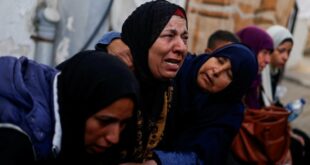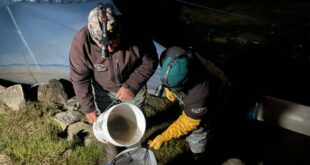Netanyahu's remarks were leaked and broadcast on Israeli television
Qatar on Wednesday said it was "appalled" by leaked remarks made by Israeli Prime Minister Benjamin Netanyahu in which he criticized the country's mediation efforts with Hamas, complicating already arduous negotiations meant to halt the hostilities in exchange for a hostage release.
In a meeting with families of hostages held by Hamas, Netanyahu said Qatar's role in the mediation was "problematic."
Qatar, a key mediator that also has deep ties to the militant group and hosts some of its exiled leaders, said Netanyahu's remarks were "irresponsible and destructive."
The public exchange came as sensitive talks were underway in an effort to advance a potential agreement that might offer some respite in the devastating three-and-a-half-month-old war. The fighting has killed more than 25,000 Palestinians, according to Palestinian health officials, displaced some 85 per cent of the territory's 2.3 million people and triggered a humanitarian catastrophe.

As the diplomacy continued, fierce fighting still raged, especially in southern Gaza, where the United Nations said an Israeli tank strike on a UN facility killed at least nine people and wounded dozens. Israel denied its forces were responsible and suggested Hamas may have launched the shelling.
Netanyahu has vowed to press ahead with the offensive until "complete victory" against Hamas.
Some 1,200 people were killed during Hamas's Oct. 7 assault on Israel, while about 250 others were kidnapped, according to the Israeli government.
Israel says it is fighting in self-defence, but it faces charges that it is committing genocide at the UN world court at The Hague, which announced that it would issue a decision Friday on South Africa's request for an interim order telling Israel to halt the hostilities.
Qatar has been a critical link in negotiating efforts between Israel and Hamas.

In Netanyahu's leaked remarks, which were broadcast Tuesday on Israeli Channel 12 television, he also told the families that he has intentionally not thanked Qatar for its mediation efforts, claiming it could put more pressure on the Islamic militant group.
"Qatar, in my opinion, is no different, in essence, from the UN. It is no different, in essence, from the Red Cross, and in some ways it is even more problematic," he said. Israel views those organizations with suspicion, seeing them as biased against it.
Netanyahu also said in the leaked audio that he had expressed anger at the U.S. for renewing a military base in the Gulf state. He said he told the Americans to put pressure on Qatar to put pressure on Hamas.

Qatar helped secure a week-long truce in November in which more than 100 hostages were released.
It's also involved in efforts to broker a new deal to bring home the roughly 130 hostages that remain in captivity.
Qatar's Foreign Ministry spokesperson, Majed al-Ansari, said on X, formerly Twitter, that his government was "appalled" by the reported remarks by Netanyahu but that they were "not surprising."
"If the reported remarks are found to be true, the Israeli PM would only be obstructing and undermining the mediation process, for reasons that appear to serve his political career instead of prioritizing saving innocent lives, including Israeli hostages," al-Ansari said.
Fighting in southern Gaza
Since the last truce ended in late November, fighting has intensified. Gaza's second-largest city of Khan Younis has been the latest focus of the war.
The United Nations agency for Palestinian refugees (UNRWA) said nine people were killed when a UN training centre in Khan Younis was struck by tank rounds, according to the agency's Gaza director, Thomas White. About 800 people had been sheltering there.

The number of deaths was likely to climb, Philippe Lazzarini, who heads UNRWA, wrote on X.
The agency said the same site was also hit earlier this week, killing six.
In Washington, U.S. State Department spokesperson Vedant Patel said: "We deplore today's attack on the UN's Khan Younis training centre.
"Civilians must be protected, and the protected nature of UN facilities must be respected, and humanitarian workers must be protected so that they can continue providing civilians with the life-saving humanitarian assistance that they need."
Israel's military initially released a statement describing the wider Khan Younis area as a base for Hamas fighters and acknowledged that fighting was taking place near large numbers of civilians.
In a second statement sent following Washington's criticism, the military said an examination of its operational systems ruled out that its forces had struck the centre. It added that a thorough review was still underway to examine the possibility that the strike was a result of Hamas fire.
Patients, civilians trapped by fighting
Earlier Wednesday, Israel battled Palestinian militants outside of the city's main Nasser Hospital, where medics said 850 patients and thousands of displaced people were trapped by the fighting because the surrounding roads were inaccessible or too dangerous.
Thousands of people fled south Tuesday from Khan Younis toward the town of Rafah, on the Egyptian border.
The UN says some 1.5 million people — around two-thirds of Gaza's population — are crowded into shelters and tents in and around Rafah.
Even there, Palestinians have found little safety, with Israel regularly carrying out strikes in and around the town.
At least five people were killed when a strike hit a mosque Wednesday in Rafah, according to Associated Press journalists who viewed the bodies at a nearby hospital.
Egypt's President Abdel Fattah al-Sisi accused Israel on Wednesday of holding up aid deliveries for the Gaza Strip as a pressure tactic, the latest sign of friction between the two countries that have maintained a blockade on the enclave.
"This is a form of pressure on the Gaza Strip and its people over the conflict and the release of hostages. They are using this as a pressure tool on the people of the Strip," Sisi said in comments to mark Egypt's national police day.
Limited amounts of aid have been delivered through the Rafah crossing between Egypt and Gaza, and since December, through the Israeli-controlled crossing of Kerem Shalom. Israel denies holding up aid.
At least 210 Palestinians have been killed in the last 24 hours, bringing the total death toll from the war to 25,700, according to the Palestinian health officials. The count does not differentiate between civilians and combatants, but the health officials say most of the dead are women and children.
With files from CBC News and Reuters
*****
Credit belongs to : www.cbc.ca
 MaharlikaNews | Canada Leading Online Filipino Newspaper Portal The No. 1 most engaged information website for Filipino – Canadian in Canada. MaharlikaNews.com received almost a quarter a million visitors in 2020.
MaharlikaNews | Canada Leading Online Filipino Newspaper Portal The No. 1 most engaged information website for Filipino – Canadian in Canada. MaharlikaNews.com received almost a quarter a million visitors in 2020.







